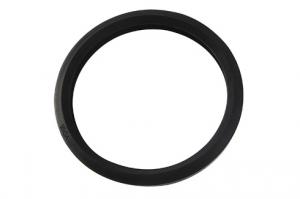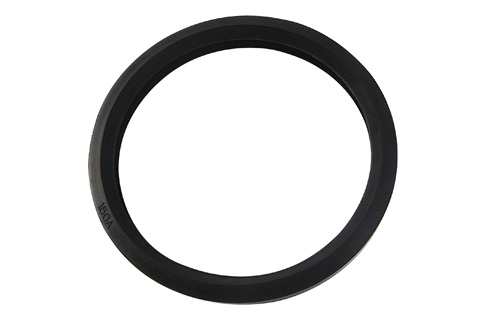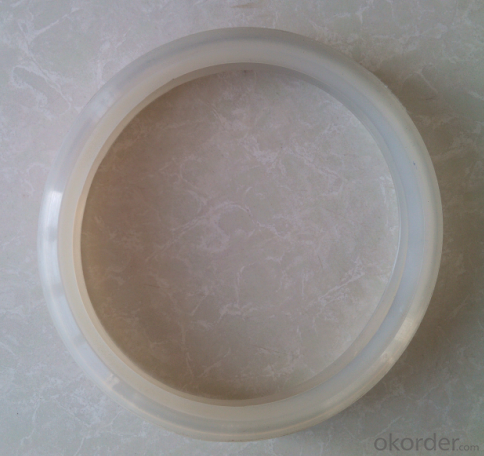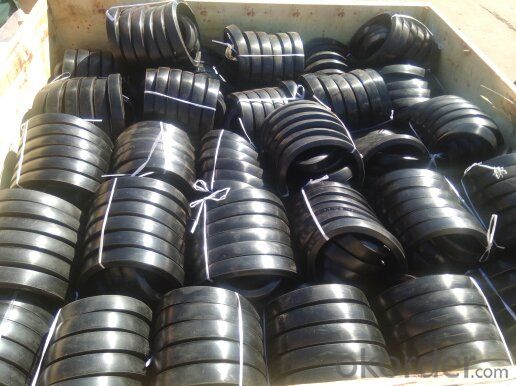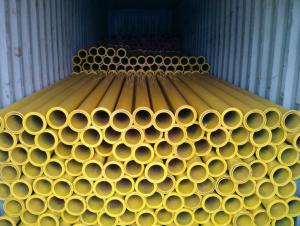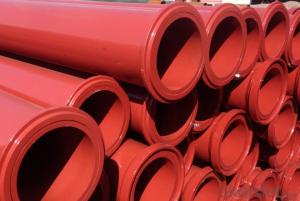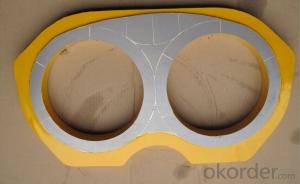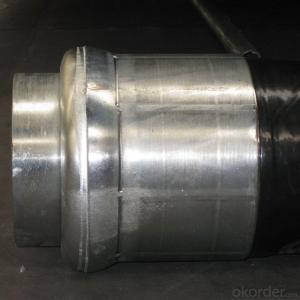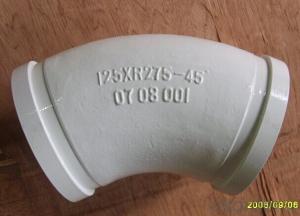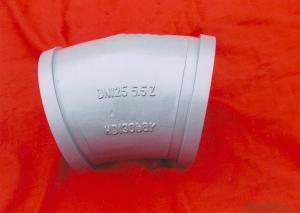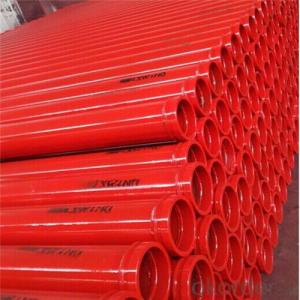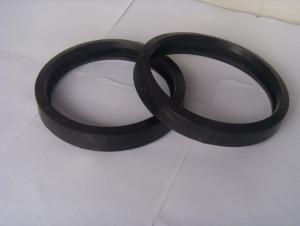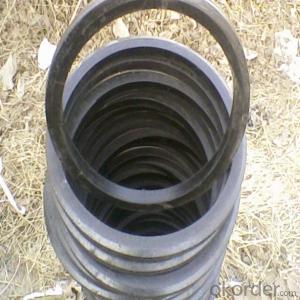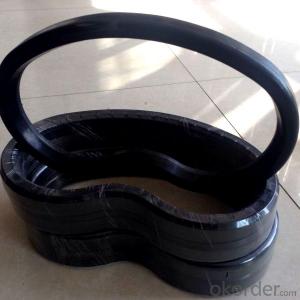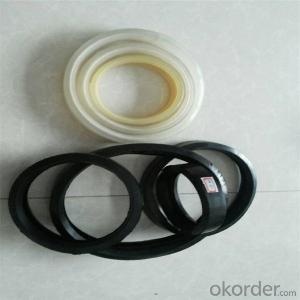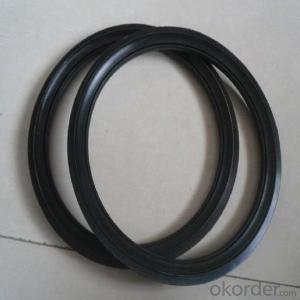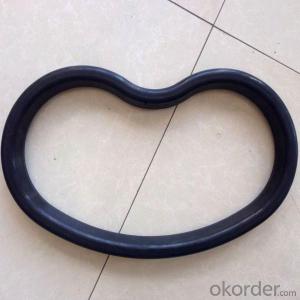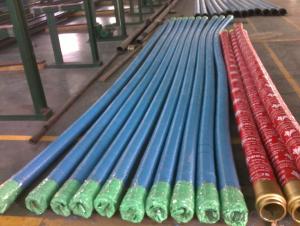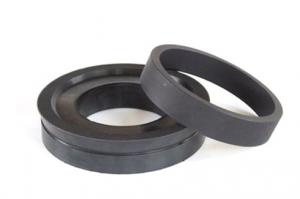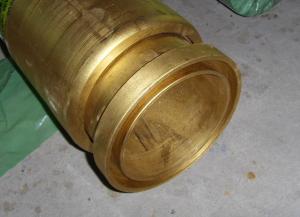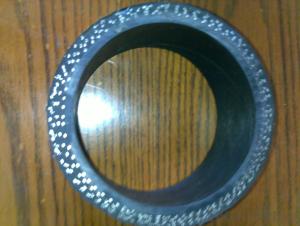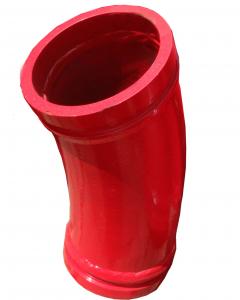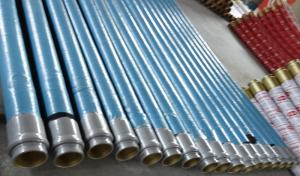Concrete Pump Truck Parts Seal Ring Rubber Seal DN80-DN200
- Loading Port:
- China main port
- Payment Terms:
- TT OR LC
- Min Order Qty:
- 100 pc
- Supply Capability:
- 10000 pc/month
OKorder Service Pledge
OKorder Financial Service
You Might Also Like
Product Description:
Concrete pump truck parts rubber seal is used within the couplings, to help seal the pipe joint and prevent the concrete from leaking. Rubber seal has different size, like DN80, DN100,DN125,DN150,DN175,DN200 and so on.
Main Product Features:
It has high pressure series and low pressure series, any series are good quality. Rubber seal feature is Corrosion resistance, high temperature resistance, abrasion resistance, which material have natural rubber and Polyurethane.
Product Specifications:
Name: Gaskets
Size : DN50,DN80,DN100,DN125,DN150,DN180,DN200,from 2inch to 8inch.
Material: rubber, Polyurethane.
Service brands: PM,Schwing, Cifa, Kyokuto, Zoomlion, Sany etc.
Application: Used in concrete pump truck,concrete pump and pipeline connection seal in construction work equipment.
FAQ:
Q1: How do we guarantee the quality of our products?
A1: We have established an advanced quality management system which conducts strict quality tests at every step, from raw materials to the final product. At the same time, we provide extensive follow-up service assurances as required.
Q2: How soon can we receive the product after purchase?
A2: Within three days of placing an order, we will begin production. The specific shipping date is dependent upon international and government factors, but is typically 5 to 15 workdays.
Q3: Can you do OEM?
A3: Yes, we can do OEM as customers' request.
Q4: How to make a quick resolution for after service?
A4: OKorder and our manufacture both have overseas branches all-around of world, IF needed, the seller shall dispatch 2 engineers to the buyer's site for supervision of training. The buyer shall make available of necessary facilities & skilled personnel at site for training.
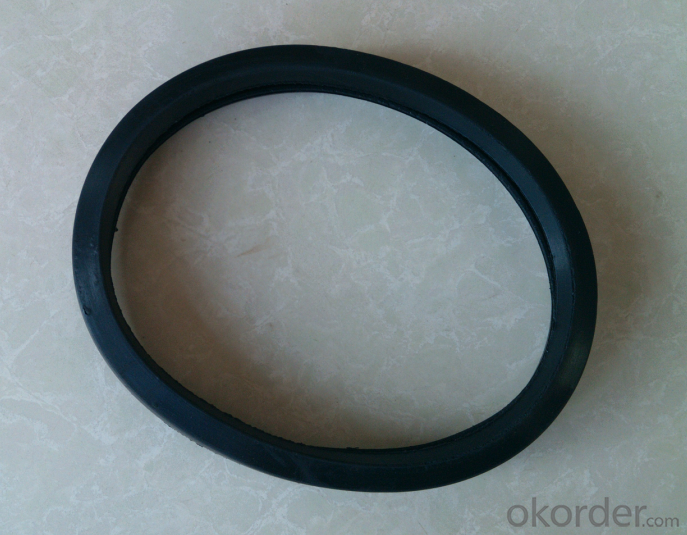
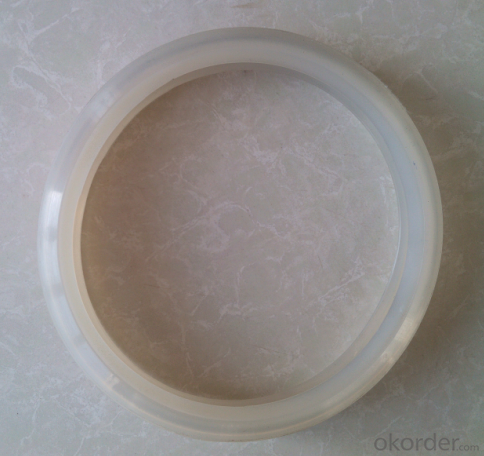
- Q: What are the different types of concrete pump hopper agitator shaft seals?
- There are various types of concrete pump hopper agitator shaft seals, including packing seals, mechanical seals, and lip seals.
- Q: What is the role of a concrete pump cylinder in a pumping system?
- The role of a concrete pump cylinder in a pumping system is to generate the necessary hydraulic pressure to push the concrete through the pipeline. The cylinder works by converting the mechanical energy from the pump into hydraulic energy, allowing for efficient and controlled movement of the concrete.
- Q: What is the function of a concrete pump hopper grate pin?
- The function of a concrete pump hopper grate pin is to securely hold the grate in place, preventing it from shifting or becoming dislodged during the concrete pumping process.
- Q: How does a hopper agitator motor ensure consistent concrete mixing?
- A hopper agitator motor ensures consistent concrete mixing by providing a continuous and powerful agitation motion within the hopper. This motion helps to break up any clumps or aggregates in the concrete mix, ensuring that all components are evenly distributed. The consistent agitation also helps to prevent settling or segregation of the mixture, resulting in a uniform and well-mixed concrete batch.
- Q: Are there any specific guidelines for the disposal of packaging materials of concrete pump spare parts?
- Yes, there are specific guidelines for the disposal of packaging materials of concrete pump spare parts. It is generally recommended to follow the local waste management regulations and guidelines provided by the respective authorities. Firstly, it is important to separate the different types of packaging materials such as cardboard boxes, plastic wraps, foam inserts, and any other materials used for packaging the concrete pump spare parts. This will enable efficient recycling or proper disposal of each material. Cardboard boxes can typically be recycled by flattening them and placing them in the designated recycling bins. Plastic wraps should also be separated and disposed of in specific recycling bins for plastics. Foam inserts, which are commonly used for protecting the spare parts, may not be recyclable in all areas and should be checked for specific recycling instructions. If recycling is not possible, foam inserts can be disposed of in regular waste bins. It is important to ensure that all packaging materials are free from any residual concrete or other hazardous substances before disposal. Any contamination should be properly cleaned or removed to prevent environmental pollution. If the packaging materials cannot be recycled or disposed of through regular waste management methods, it is recommended to contact local recycling centers or waste management facilities to inquire about specific disposal options for these materials. They may provide guidance or accept these materials for specialized processing or disposal. Overall, it is crucial to prioritize responsible waste management practices and comply with the specific guidelines provided by local authorities to ensure the proper disposal of packaging materials of concrete pump spare parts.
- Q: How often should hopper grate springs be inspected or replaced in a concrete pump?
- To ensure optimal performance and prevent potential issues, it is essential to regularly inspect the hopper grate springs in a concrete pump. The frequency of inspection or replacement depends on factors such as pump usage, operating conditions, and manufacturer recommendations. However, a general rule is to inspect the springs at least every six months or after every 500 hours of operation, whichever comes first. During the inspection, thoroughly examine the springs for any signs of wear, damage, or deformation. Check for cracks, excessive rust, or loss of tension. If any of these issues are found, immediate replacement is necessary to maintain proper functioning of the hopper grate system. Regular inspection and timely replacement of hopper grate springs are vital to prevent clogging or blockage in the hopper, which can lead to pump malfunctions or downtime. It is advisable to consult the concrete pump manufacturer's guidelines or seek assistance from a professional technician to determine specific inspection and replacement intervals based on the pump's make and model.
- Q: What are the different types of concrete pump hydraulic filters?
- There are three main types of concrete pump hydraulic filters: suction filters, return line filters, and pressure line filters. Suction filters are located at the inlet of the pump and prevent debris from entering the system. Return line filters clean the hydraulic oil as it returns from the system back to the reservoir. Pressure line filters are installed in the discharge line and remove contaminants before the oil reaches the hydraulic components.
- Q: Can concrete pump spare parts be tested for performance and quality before installation?
- It is imperative to test concrete pump spare parts for performance and quality before installation. This ensures that they conform to necessary standards and specifications, and aids in detecting any flaws or concerns that might impact their performance or longevity. Testing can be carried out through diverse methods, including physical inspections, functional assessments, or deploying specialized equipment to gauge specific parameters. By conducting pre-installation tests on these spare parts, potential issues can be identified and rectified at an early stage, thereby guaranteeing peak performance and quality.
- Q: What are the different types of concrete pump clamps?
- Concrete pump clamps come in various types, each serving a specific purpose and accommodating different pump sizes. Some commonly used clamps are as follows: 1. Snap clamps: These clamps utilize a snap mechanism, making them easy to install and remove. They are suitable for securing smaller diameter hoses and pipes. 2. Bolt clamps: Offering a stronger grip, bolt clamps consist of a metal band with bolts that can be tightened to hold the hose or pipe firmly in place. They are typically used for larger diameter hoses and pipes. 3. Wedge clamps: Wedge clamps use a wedge device to firmly secure the hose or pipe. They are commonly employed in high-pressure applications or when working with heavy-duty pumps. 4. Quick-release clamps: Designed for quick installation and removal, these clamps feature a lever or latch for easy adjustment. They are ideal for situations requiring frequent hose or pipe changes. 5. Flanged clamps: Specifically designed for pipes with flanges, these clamps establish a tight and secure connection between the pump and the pipe, preventing leaks or disconnections. To ensure the appropriate clamp selection, consider the specific requirements of your project, such as pump size, hose or pipe diameter, and expected pressure. Seeking guidance from a professional or supplier will assist you in choosing the suitable clamp for your needs.
- Q: How can one determine the correct weight and balance requirements for concrete pump spare parts?
- To ascertain the appropriate weight and balance specifications for concrete pump spare parts, several factors must be taken into account. First and foremost, consulting the manufacturer's specifications and guidelines specific to the concrete pump model is of utmost importance. These documents typically contain comprehensive information regarding the weight and balance requirements for each spare part. Secondly, it is essential to comprehend the function and purpose of each spare part. Different components vary in weight and can significantly impact the overall balance of the pump. For example, larger elements like booms or outriggers may necessitate precise weight distribution to ensure operational stability. Moreover, considering the intended usage and environmental conditions of the concrete pump is imperative. If the pump is expected to operate in challenging terrains or extreme weather, additional weight might be necessary to enhance stability. In addition to the manufacturer's guidelines, seeking counsel from experts or engineers knowledgeable about concrete pumps can provide invaluable insights. These professionals can analyze the specific requirements of the pump and offer guidance on the appropriate weight and balance specifications for the spare parts. Lastly, conducting thorough testing and inspections after installing any spare parts is crucial. This ensures compliance with the weight and balance requirements and allows for any necessary adjustments to be made. In conclusion, determining the correct weight and balance requirements for concrete pump spare parts necessitates a combination of understanding manufacturer guidelines, considering the purpose and conditions of the pump, seeking expert advice, and performing comprehensive testing and inspections.
Send your message to us
Concrete Pump Truck Parts Seal Ring Rubber Seal DN80-DN200
- Loading Port:
- China main port
- Payment Terms:
- TT OR LC
- Min Order Qty:
- 100 pc
- Supply Capability:
- 10000 pc/month
OKorder Service Pledge
OKorder Financial Service
Similar products
Hot products
Hot Searches
Related keywords
